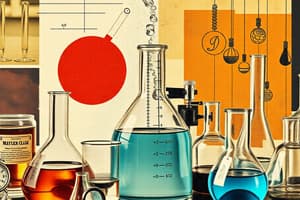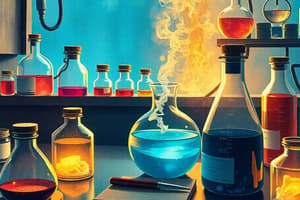Podcast
Questions and Answers
What is the primary function of a Bunsen burner in a laboratory setting?
What is the primary function of a Bunsen burner in a laboratory setting?
- To measure fluid accurately
- To produce a very hot flame for heating (correct)
- To transfer solids without spilling
- To store liquids safely
Which laboratory container is designed for mixing, stirring, and heating liquids?
Which laboratory container is designed for mixing, stirring, and heating liquids?
- Evaporating dish
- Beaker (correct)
- Reagent bottle
- Erlenmeyer flask
What distinguishes an Erlenmeyer flask from other containers?
What distinguishes an Erlenmeyer flask from other containers?
- It consists of a graduated tube for precise measurement
- Its bottom is wider than the top to allow quicker heating (correct)
- It is used exclusively for distillation experiments
- It has a pouring lip for easy dispensing
Which of the following items is specifically used to dispense liquids accurately in laboratory procedures?
Which of the following items is specifically used to dispense liquids accurately in laboratory procedures?
What is the purpose of a funnel in a laboratory?
What is the purpose of a funnel in a laboratory?
Which laboratory apparatus is primarily used for heating and evaporating liquids?
Which laboratory apparatus is primarily used for heating and evaporating liquids?
Which laboratory tool is characterized by a vertical metal tube connected to a gas source?
Which laboratory tool is characterized by a vertical metal tube connected to a gas source?
What is the primary use of a reagent bottle in laboratory settings?
What is the primary use of a reagent bottle in laboratory settings?
What is the primary function of a mortar and pestle in a laboratory setting?
What is the primary function of a mortar and pestle in a laboratory setting?
Which apparatus is specifically designed to support heated items such as beakers or flasks?
Which apparatus is specifically designed to support heated items such as beakers or flasks?
What is the main purpose of a thermometer in a laboratory?
What is the main purpose of a thermometer in a laboratory?
Which laboratory equipment is essential for holding test tubes upright during experiments?
Which laboratory equipment is essential for holding test tubes upright during experiments?
What should be avoided when handling corrosive chemicals?
What should be avoided when handling corrosive chemicals?
Which of the following is a key characteristic of flammable chemicals in a lab environment?
Which of the following is a key characteristic of flammable chemicals in a lab environment?
What type of flask is specifically used for preparing solutions of fixed volume?
What type of flask is specifically used for preparing solutions of fixed volume?
What is the recommended action for handling volatile solvents in a laboratory setting?
What is the recommended action for handling volatile solvents in a laboratory setting?
What does the term 'pseudoscience' refer to?
What does the term 'pseudoscience' refer to?
How is science fundamentally different from superstition?
How is science fundamentally different from superstition?
Which branch of science is primarily concerned with the composition and changes of matter?
Which branch of science is primarily concerned with the composition and changes of matter?
Why are precise and accurate measurements crucial in scientific investigations?
Why are precise and accurate measurements crucial in scientific investigations?
What is the primary goal of the scientific method?
What is the primary goal of the scientific method?
Which statement best describes the term 'Earth Science'?
Which statement best describes the term 'Earth Science'?
What is a characteristic of science that distinguishes it from other belief systems?
What is a characteristic of science that distinguishes it from other belief systems?
Which of the following is NOT a branch of science as defined?
Which of the following is NOT a branch of science as defined?
Flashcards are hidden until you start studying
Study Notes
Understanding Science
- Science originates from the Latin word "scientia," meaning knowledge.
- Defined as a systematic effort to establish knowledge explaining natural and physical phenomena using objective methods.
- Different from pseudoscience and superstition; pseudoscience presents untested beliefs as scientific claims, while superstition lacks experimental validation.
Branches of Science
- Physics: Examines matter and energy and their interactions.
- Chemistry: Studies matter's composition, structure, properties, changes, and energy in these processes.
- Earth Science: Focuses on Earth's composition, internal and surface processes, and its comparison with other celestial entities.
- Biology: Involves the study of living organisms, encompassing various subspecialties within the field.
Common Laboratory Tools and Equipment
- Beaker: Open glass cylinder for mixing, stirring, and heating liquids.
- Reagent Bottle: Stores and mixes chemicals.
- Bunsen Burner: Metal tube connected to a gas source for producing intense flames.
- Burette: Graduated tube used for precise fluid dispensing.
- Erlenmeyer Flask: Features a wide base for efficient heating of liquids.
- Evaporating Dish: Heats and evaporates liquids.
- Florence Flask: Heats substances uniformly, commonly used in distillation.
- Funnel: Transfers liquids between containers to prevent spillage.
- Microscopical Spatula: Small tool for transferring solid materials.
- Mortar and Pestle: Used for grinding solids into powder.
- Pipette: Moves small amounts of liquids.
- Ring Stand: Supports beakers and flasks during heating.
- Test Tube Holder: Safely holds test tubes during heating.
- Test Tube Rack: Upright storage for test tubes during experiments.
- Thermometer: Measures temperature of solids, liquids, and gases, typically in Celsius.
- Tongs: Handles hot objects like flasks and evaporating dishes.
- Volumetric Flask: Creates solutions of fixed volume for precise chemical preparation.
Laboratory Safety Rules
- Poisonous Chemicals: Handle with care to avoid ingestion or inhalation; dangerous upon contact.
- Flammable Chemicals: Store in flame-resistant cabinets to mitigate fire risks.
- Corrosive Substances: Avoid skin contact, as they can damage materials and cause rusting.
Studying That Suits You
Use AI to generate personalized quizzes and flashcards to suit your learning preferences.




